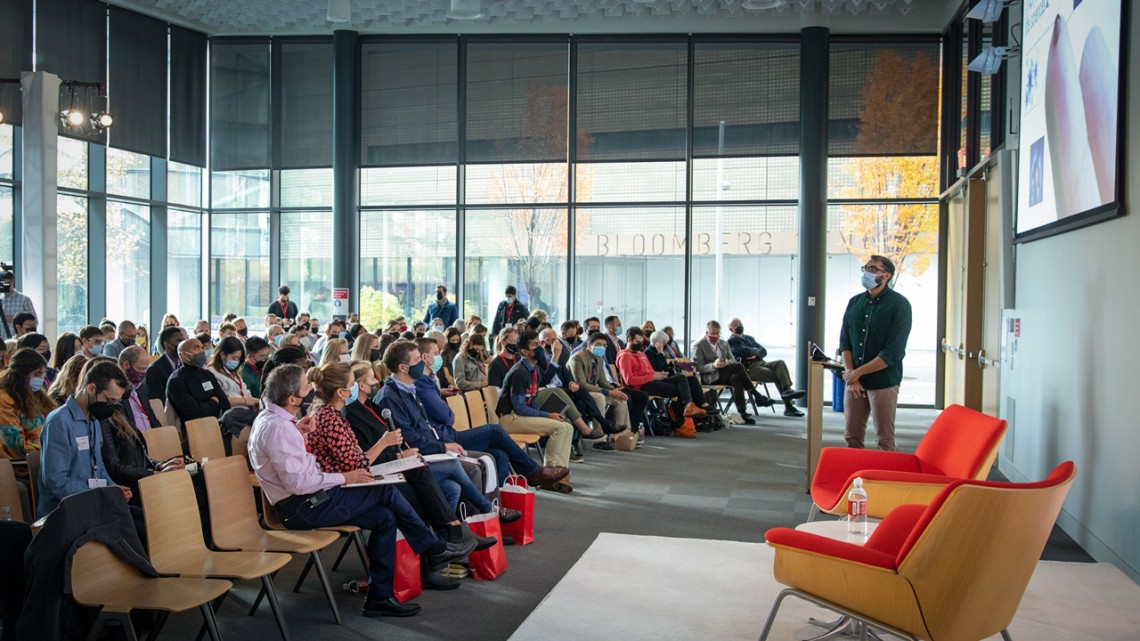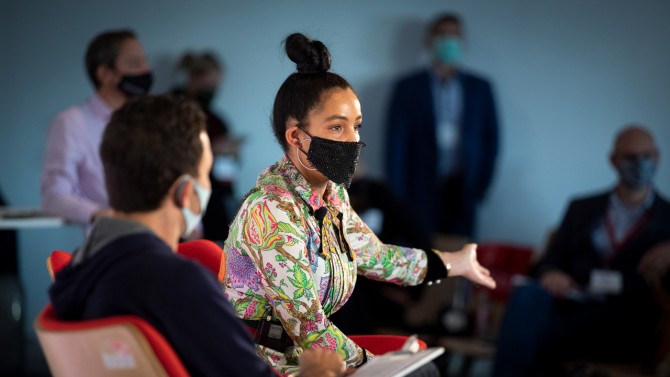
Sasank Vemulapati, Ph.D. ’19, founder and CEO of Hermes Life Sciences, addressing attendees at this year’s Eclectic Convergence, hosted by Entrepreneurship at Cornell and Cornell Tech.
Entrepreneurial leaders share advice at NYC conference
By Kathy Hovis
From mindfulness to mRNA vaccines to the music business, the 250 attendees at this year’s Eclectic Convergence conference Nov. 12 got a front row seat into the many facets of life as an entrepreneur.
Held at the Verizon Center on the Cornell Tech campus in New York City, the conference, hosted by Entrepreneurship at Cornell and Cornell Tech, drew an audience of Cornell alumni, students and faculty, as well as others interested in business creation and venture capital.
“I love seeing all of these people affiliated with Cornell doing impactful things for the world and for the future,” said Jasheah Howard, M.Eng. ’22, who attended the conference the day after pitching her business as part of eLab’s pitch night. “I also love being around other fellow entrepreneurs, learning from them and learning new things.”
The event honored Jessica Rolph ’97, MBA ‘04, as the 2021 Cornell Entrepreneur of the Year. Rolph, co-founder and CEO of Lovevery, joined in a conversation with Zach Shulman ’87, J.D. ’90, director of Entrepreneurship at Cornell, to share some highlights of her career so far.
Rolph, whose first company, Happy Family, focused on infant nutrition, said she was inspired to start Lovevery knowing that she wanted her next project to focus on infant brain development.
“I discovered a really nerdy doctoral thesis and it really changed everything,” she said. “It was so much less about the stuff, but about how important these early experiences are with the physical world, with how things work.”
The conference also included a pitch contest between four companies from Cornell and Cornell Tech. Sasank Vemulapati, Ph.D. ‘19, founder and CEO of Hermes Life Sciences, won the $5,000 prize for his company, which builds portable blood sample processing solutions.
The conference’s first speaker was Clif Smith, EY’s Americas mindfulness leader, who talked about the rising interest in mindfulness across businesses and led attendees in a mindfulness exercise.
“We spend precious little time in the present moment and it has implications on our health and our well-being,” Smith said, adding that studies show that people touch their phones 2,617 times a day. Instead, being mindful of the “little things in life” can help people assure they are “awake for the whole thing.”
Throughout the rest of the day, speakers referred to the importance of being mindful in their personal and professional journeys.
Colin Walsh ’90, CEO and founder, Varo Bank, described how he created his bank, which caters to people who aren’t well served by the traditional banking system.
“I just wanted to do something that was really interesting, but was also truly impactful,” he said. “We’re living in an age of growing inequality, but also of advancing technology, and with the confluence of the two, I thought we could build something that could effectively serve this huge population of people who were being left behind.”
Walsh explained how important it is for his company to stay close to the customer, offering opportunities for them to suggest features, conducting surveys and analyzing net promoter score measurements, “allowing us to react quickly if we see there’s a problem or see what customers are loving.”
Monique Idlett, founder and managing partner of Reign VC, also spoke about the importance of staying close to her customers, in her case company founders who have not been supported by traditional venture capitalists.
“We have a lens on women and people of color, because in 2020, they’re still getting less than 3% of funding from venture capitalists,” she said.
Before starting Reign VC, Idlett spent more than 20 years in the music industry, serving as CEO of Mosley Brands and Mosley Music Group, home to artists including Timbaland, One Republic, Nelly Furtado and Chris Cornell.
She said while a natural tendency is to hire people who are more like us, “I like to surround myself with all types of people because I think that’s when we get the answers that we need.”
Doug Lankler, J.D. ’90, executive vice president and general counsel for Pfizer, shared a bit of the story of the company’s COVID-19 vaccine and COVID pill development.
During the pandemic, Lankler said CEO Albert Bourla constantly reminded Pfizer scientists and colleagues, “If not us, then who?” This sense of purpose inspired them to develop solutions faster than they thought possible, without compromising in any way the safety and efficacy of the vaccine.
Bourla would challenge his team to accomplish in days what would normally take weeks or months, Lankler said. At first, they would say it wasn’t possible, but “time and time again people would go off and reexamine things and then come back and say, actually, we can do it faster.”
As general counsel, Lankler said his priority was ensuring they had a safe and effective vaccine. He and his team also dealt with regulations, licensing and contracts.
“We obviously were not going to cut any corners from the safety or efficacy standpoint,” he said.
Learning from this process, Lankler sees the opportunity for Pfizer and others to advance drug and vaccine development for other diseases and conditions.
“The whole industry is rooting for each other,” he said.
Kathy Hovis is a writer for Entrepreneurship at Cornell.
Media Contact
Get Cornell news delivered right to your inbox.
Subscribe

